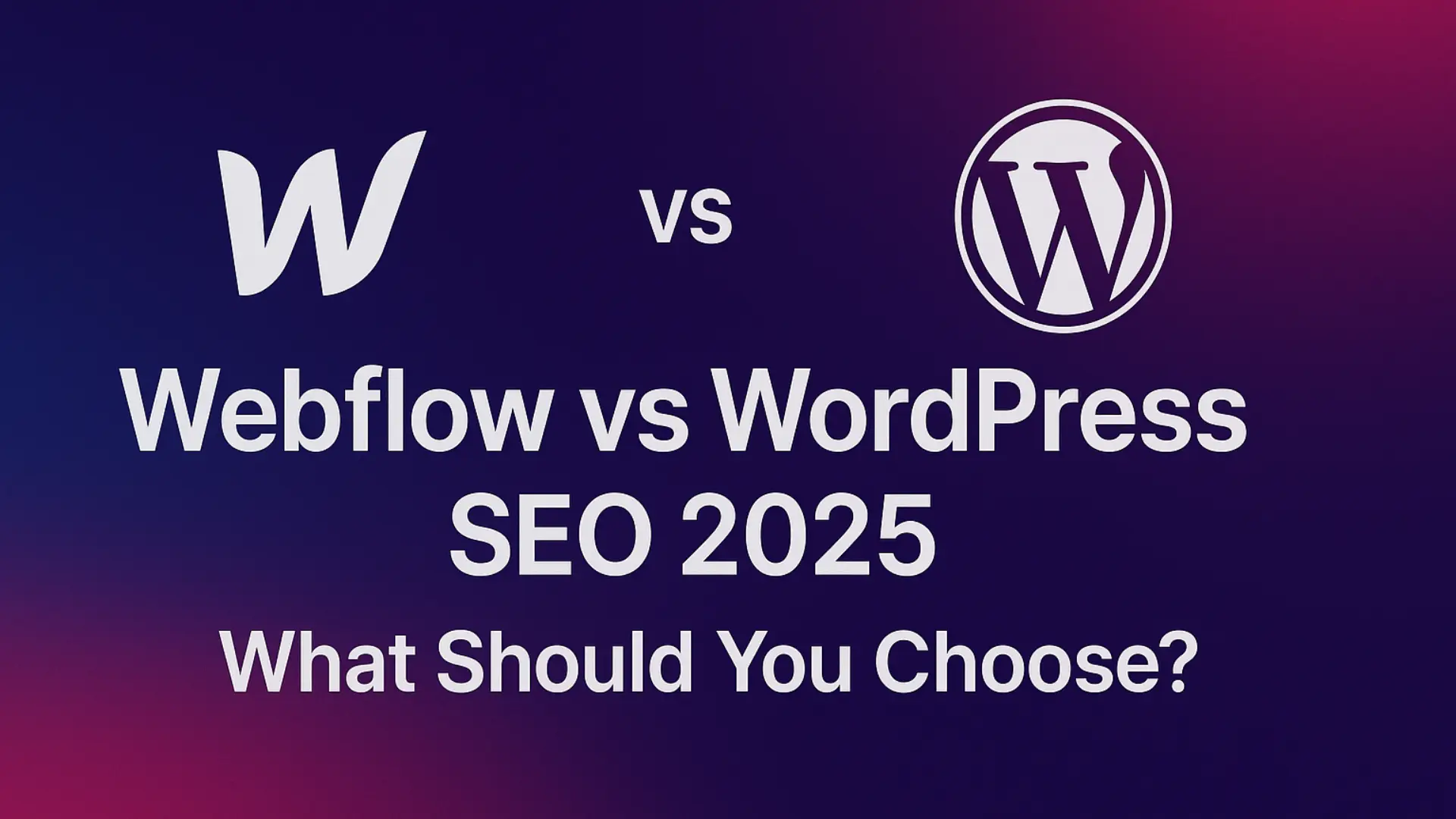
Introduction
If you are starting a new website in 2025, selecting the right CMS is more important than ever. While WordPress powers most websites globally, Webflow has been gaining popularity. However, the real question is: Which is better for SEO in 2025?
This Webflow vs WordPress SEO 2025 guide compares both platforms across speed, customization, indexing, schema, and scalability. By the end, you will know which platform fits your SEO goals best.
1. Quick Overview of WordPress and Webflow
WordPress
- Open-source CMS powering over 40% of all sites
- Flexible with plugins and themes
- SEO-friendly through tools like Yoast SEO and Rank Math
- Requires hosting, security, and manual updates
Webflow
- Visual design + CMS + hosting in one platform
- Faster by default with clean HTML & CSS
- Built-in SEO controls (meta tags, sitemap, canonical tags)
- Limited plugin ecosystem compared to WordPress
Therefore, both offer unique advantages depending on user needs.
2. Speed & Core Web Vitals
Webflow:
- Auto-optimized for speed
- Global CDN included
- Excellent Core Web Vitals performance
WordPress:
- Speed varies with theme and hosting
- Needs caching, image optimization, and lightweight setup
- Can match Webflow if properly optimized
As a result, Webflow wins for beginners, whereas WordPress works best for developers with technical skills.
3. SEO Customization
WordPress:
- Plugins provide full SEO control
- Schema, redirects, and Open Graph handled easily
- Ideal for complex SEO projects
Webflow:
- SEO tools are simple but limited
- Meta tags, redirects, and sitemap control included
- No advanced plugin-based flexibility
Consequently, WordPress is better for advanced SEO, while Webflow remains useful for smaller projects.
4. Indexing & Schema Markup
Webflow:
- Automatic sitemap generation
- Simple robots.txt and canonical setup
- Custom schema requires manual JSON-LD
WordPress:
- SEO plugins automate schema and indexing rules
- Supports FAQ, product, and review schema
- Enables rich snippets easily
Therefore, WordPress wins for structured data.
5. Content Management & Blogging
WordPress:
- Built originally for blogging
- Manages thousands of posts efficiently
- Includes editorial workflows and optimization plugins
Webflow:
- Works well for smaller blogs
- Performance issues appear at scale
Thus, WordPress dominates for blogging-heavy sites, while Webflow fits portfolios or simple blogs.
6. Security & Updates
Webflow:
- Security and SSL managed automatically
- No plugin updates required
WordPress:
- Needs frequent updates
- Security depends on host and plugin setup
In short, Webflow is better for non-technical users, but WordPress provides flexibility if maintained correctly.
7. Cost Considerations
Webflow:
- Hosting included
- Plans get expensive with growth
WordPress:
- Free CMS but requires hosting, themes, and plugins
- More cost-effective for large projects
In conclusion, Webflow offers convenience, while WordPress is more scalable for bigger websites.
8. Which Platform Should You Choose in 2025?
Choose WordPress if:
- SEO is your main priority
- You need advanced schema and plugins
- You plan a large content site
Choose Webflow if:
- You want fast speed and security by default
- You value simple design tools
- You’re building a smaller portfolio or business site
Quick Comparison Table
| Factor | WordPress | Webflow |
|---|---|---|
| Speed | Needs optimization | Fast by default |
| SEO Tools | Plugins (Yoast, Rank Math) | Built-in controls |
| Schema Markup | Full via plugins | Manual JSON-LD |
| Blogging | Excellent & scalable | Best for smaller blogs |
| Security | Needs manual setup | Auto-managed |
| Cost | Low at scale | Higher at scale |
Final Thoughts
In 2025, both Webflow and WordPress can rank well on Google. However, your choice depends on your long-term SEO strategy.
- Webflow → Easy, fast, and secure for small sites.
- WordPress → Flexible, scalable, and SEO-rich for growing businesses.
Therefore, if SEO is your priority, WordPress is the smarter choice.


